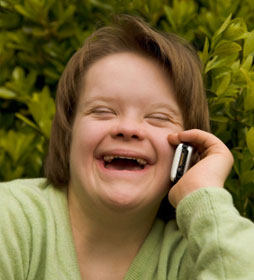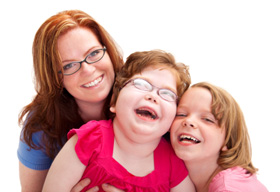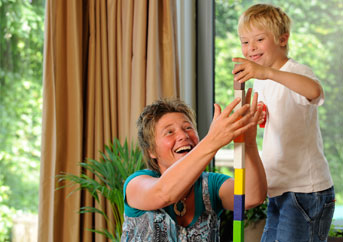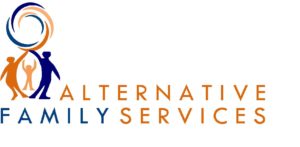Special Needs Foster Care Services

Family Alternatives for Children with Developmental Disabilities (FACDD), is special needs foster care, providing for the care of children and youth with disabilities within the foster care system. Foster children with developmental, psychical or mental disabilities need a special home in which to live and thrive. AFS provides therapeutic family-based living for children in foster care from birth 18 years of age and older who require specialized medical care due to disabilities in the child.
Defining Disabilities in Foster Care
Special needs foster care, special education and other such terms will have different official, legal definitions in different geographies. The Centers for Disease Control describes developmental disabilities in particular as a diverse group of severe chronic conditions that are due to mental health and/or physical impairments such as problems with language, mobility, learning, self-help and independent living.
Alternative Family Services’ FACDD program specializes in working with foster children and youth that commonly have the following developmental disabilities: Autism Spectrum Disorders, Nervous System Disabilities, Down Syndrome, Fragile X Syndrome and Fetal Alcohol Syndrome.
Supporting Foster Families with Unique Medical Care Concerns
To ensure foster homes in which a foster child has unique concerns is providing the best quality of life for that youth, AFS provides a number of specialized services and support above and beyond what is offered to the typical foster parent. Because these children have particular needs that must be yet, AFS goes above and beyond to ensure that FACDD are working in the best interest of the child, foster families and the biological family.
Individualized case management is provided for in every instance within the FACDD program. A treatment plan is implemented within at least 30 days of admissions by a team of trained, experienced professionals, and 24/7 emergency case management response is available should the need arise during the placement.
To provide for optimal behavioral support for foster parents, professional consultants with extensive experience in the field develop detailed, customized plans for addressing specific behaviors, and/or developmental issues that may arise during the placement.
AFS strongly believes in and advocates for person-centered planning. Person-centered planning develops a “toolbox” of resources, enabling disabled individuals to choose their own pathways to success.
Respite care is provided to ensure that foster parents have additional support and resources for the ongoing, day-to-day care of the foster youth or children. Foster families may utilize an approved respite provider to temporarily provide care to the foster child.
Skills Trainers for Children are available to all those participating in the FACDD program with AFS. One-to-one skills trainers work directly with both the child in the home and the wider community to improve identified skill deficits, often participating in recreational activities and practicing social, educational and vocational skills.
Statistics on Children with Disabilities within Foster Care
Unfortunately, many youth who find themselves within the foster care system suffer from various disabilities, including mental health issues and developmental disabilities.
- Of the roughly 400,000 children in the foster care system nationwide in a typical year, approximately 7 percent of children in foster care have an intellectual disability. Overall, youth with intellectual disabilities are around 1.9 times more likely to be in the foster care system versus their peers who don’t have an intellectual disability.
- Around 7 to 10 percent of children in foster care have Autism or are on the Autism spectrum. Overall, youth on the Autism spectrum are around 2.4 times more likely to be in the foster care system versus their peers who don’t have Autism or are not on the Autism spectrum.
- Foster youth are seven times more likely than non-foster youth to have Depression.
- Foster youth are five times more likely than non-foster youth to have Anxiety.
- In comparison to veterans, former foster youth are twice as likely to suffer from Post-Traumatic Stress Disorder.
- One out of every two foster youth has dealt with four or more Adverse Childhood Experiences.
- Eight out of every 10 foster youth enter the foster care system with notable mental health needs.
How To Become a Special Needs Foster Care Provider
The process to become a foster parent is the same, but AFS provides additional training, support and services should a family decide to move forward with FACDD. To learn more about FACDD, get started or just have any questions answered, please be sure to reach out to us today via email or phone call.
Special Needs Foster Care FAQs
How long is the typical placement?
The length of the placement of any foster youth, including foster children with disabilities, can vary greatly based on a wide variety of factors. But, either way, any foster care placement is intended to be a temporary situation that would later be addressed either through adoption, reunification or emancipation. The average age of a foster youth is 8 and a half years old, and a foster youth typically spends around 20 months in foster care. In California in particular, foster youth are most commonly in out-of-home care for less than 12 months.
What kind of disabilities should a Special Needs Foster Care Provider expect prior to a placement occurring?
Every single child is unique; no two are ever the same. AFS will work with children and families to make sure each placement suits the needs and requirements of everyone involved.
Who covers and treats the medical conditions and any ongoing health-related concerns with foster children with disabilities?
In California, medical care is covered through Medi-Cal. For foster children with developmental disabilities and their families, AFS also provides a wide variety of services and support from trained staff that is tailored to the specific needs of the child.
All About AFS
Alternative Family Services is a foster, adoption and mental health agency serving thousands of foster children, youth and families since 1978. The mission of AFS is to restore and improve the safety, health and well-being of vulnerable children in families and communities.

The Centers for Disease Control describes developmental disabilities as a diverse group of severe chronic conditions that are due to mental and/or physical impairments such as problems with language, mobility, learning, self-help and independent living.
Alternative Family Services’ FACDD program specializes in working with foster children and youth that commonly have the following developmental disabilities:
- Autism Spectrum Disorders
- Nervous System Disabilities
- Down Syndrome
- Fragile X Syndrome
- Fetal Alcohol Syndrome

